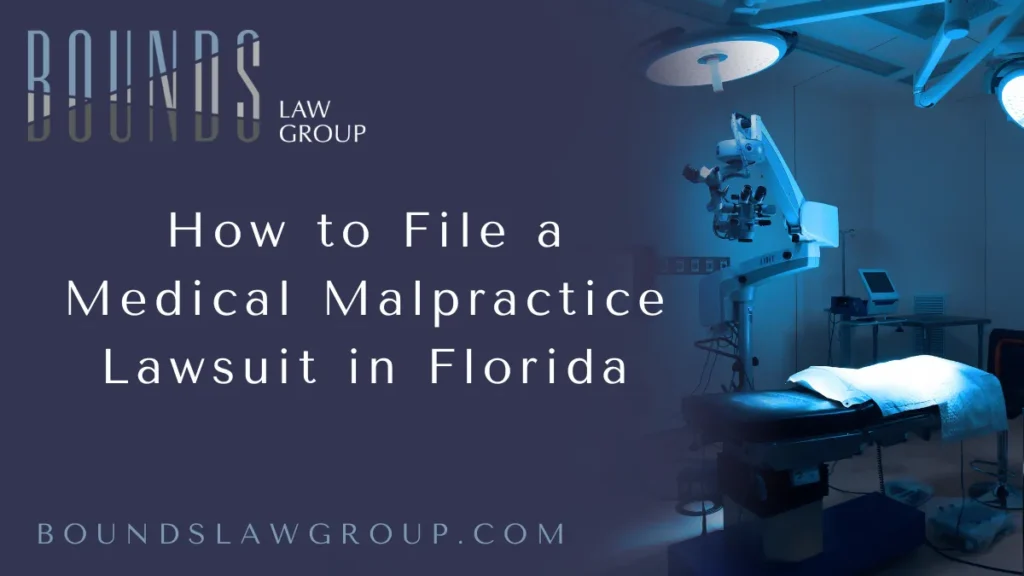
If you or a loved one has suffered due to a medical professional’s negligence in the Sunshine State, you may be entitled to compensation. Knowing how to file a Florida medical malpractice claim is critical to preserving your legal rights. At Bounds Law Group, we specialize in guiding victims through this complex process with precision, care, and a relentless pursuit of justice.
Contact us today through our free case evaluation form or call 877-644-5122.
What Constitutes Medical Malpractice in Florida
Before initiating a claim, it’s essential to understand what qualifies as medical malpractice. In Florida, medical malpractice occurs when a healthcare provider fails to meet the standard of care, and that failure results in injury or death to a patient. This can include:
- Misdiagnosis or Delayed Diagnosis
- Surgical Errors or Unnecessary Surgery
- Birth Injuries
- Medication or Anesthesia Mistakes
- Failure to Treat
- Poor Follow-up or Aftercare
These acts of negligence must directly cause harm. Simply experiencing a poor outcome does not always equate to malpractice.

Step 1: Determining If You Have a Valid Medical Malpractice Case
The first and most important step in learning how to file a Florida medical malpractice claim is determining whether you have a legitimate case. Florida law requires the following elements to be present:
- A provider-patient relationship
- Deviation from the standard of care
- A direct link between the deviation and the injury
- Measurable damages such as medical bills, lost income, or pain and suffering
At Bounds Law Group, we offer an in-depth case review to assess these factors and determine your best path forward.
Step 2: Complying With Florida’s Pre-Suit Requirements
Florida has strict pre-suit requirements under Chapter 766 of the Florida Statutes. Before filing your lawsuit, you must:
1. Conduct a Pre-Suit Investigation:
You must secure a written expert opinion from a qualified medical professional stating that your case has merit.
2. Notify All Prospective Defendants:
You must serve each potential defendant with a Notice of Intent to Initiate Litigation, including the expert’s affidavit.
3. Undergo a 90-Day Waiting Period:
During this period, the healthcare providers have the chance to evaluate the claim and decide whether to settle or deny liability.
Failure to follow this process can result in your case being dismissed. Having experienced legal counsel to manage these steps is vital.
Step 3: Filing the Lawsuit
Once the 90-day pre-suit period has expired and the case is still unresolved, you can officially file your lawsuit in a Florida civil court. The complaint must:
- Clearly outline your allegations
- Include factual and legal grounds for your claim
- State the damages you’re seeking
This is a formal legal proceeding that triggers discovery, depositions, and court dates. The legal team at Bounds Law Group meticulously prepares every case to be trial-ready.
Step 4: Proving Your Medical Malpractice Claim
To win your case, your attorney must prove four critical elements:
- Duty of Care – The provider owed you a duty as your treating physician
- Breach of Duty – They failed to meet the accepted standard of care
- Causation – Their negligence directly caused your injury
- Damages – You suffered quantifiable losses
We work with expert witnesses and gather extensive medical records to build a compelling case that stands up in court.
Statute of Limitations for Florida Medical Malpractice Claims
Understanding the time limits is crucial. Florida law provides:
- Two years from the date the incident was discovered, or should have been discovered, to file a claim
- A maximum of four years from the date of the malpractice, regardless of when you found out (except in cases of fraud or concealment)
Waiting too long can permanently bar your claim. Don’t delay—complete the free case evaluation form or call us now at 877-644-5122.
Common Defenses in Medical Malpractice Lawsuits
Healthcare providers often defend themselves by asserting:
- The injury was a known risk and not due to negligence
- The patient’s own actions contributed to the injury
- There is no clear evidence linking the malpractice to the damages
- The standard of care was not violated
We anticipate these arguments and prepare a detailed legal strategy to overcome them.
Potential Compensation in a Florida Medical Malpractice Claim
When filing a Florida medical malpractice claim, you may be entitled to:
- Medical expenses (past and future)
- Lost wages and earning capacity
- Pain and suffering
- Disability or disfigurement
- Loss of consortium (for family members)
- Punitive damages (in cases of gross negligence)
Each case is unique, and the potential value of your claim depends on the extent of your damages and the strength of the evidence.

How to Choose the Right Attorney for Your Florida Medical Malpractice Case
When pursuing a Florida medical malpractice claim, the attorney you choose can significantly impact the outcome of your case. Selecting the right lawyer is crucial, as this is a highly specialized area of law that requires both expertise and experience. Here are some factors to consider when choosing a medical malpractice attorney:
1. Specialization in Medical Malpractice Law
Not all personal injury lawyers handle medical malpractice cases. It is essential to choose a lawyer or law firm that specializes in medical malpractice litigation. These attorneys have in-depth knowledge of Florida's specific legal requirements for malpractice claims, including the pre-suit investigation and the expert testimony needed to build a strong case. At Bounds Law Group, our attorneys are well-versed in the complexities of medical malpractice law and are committed to advocating for victims of medical negligence.
2. Experience and Track Record of Success
A skilled medical malpractice attorney should have a proven track record of handling complex cases and obtaining favorable verdicts or settlements for their clients. Look for a law firm with significant experience in medical malpractice cases similar to yours. The more experienced the attorney, the better equipped they will be to navigate the nuances of medical evidence and cross-examine expert witnesses effectively.
3. Strong Reputation and Client Reviews
Before hiring an attorney, take the time to research their reputation. Client reviews, testimonials, and online ratings can provide valuable insight into the lawyer’s ability to communicate, the level of service provided, and their overall approach to handling cases. Bounds Law Group has built a reputation for excellence, providing personalized legal representation to every client while maintaining transparency and accessibility throughout the entire process.
4. Communication and Personal Attention
Medical malpractice cases can be complex and lengthy, requiring constant communication between the client and attorney. Choose an attorney who is responsive, listens to your concerns, and keeps you informed at every stage of the case. At Bounds Law Group, we prioritize clear, direct communication, ensuring that our clients understand their options and are never left in the dark about the progress of their case.
5. Resources to Handle Complex Medical Evidence
Medical malpractice cases often require expert witnesses to provide testimony about the standard of care, medical procedures, and the extent of the injury. Make sure your attorney has the resources and connections to retain credible medical experts to testify on your behalf. A reputable firm like Bounds Law Group has access to top-tier medical professionals who can help strengthen your case and provide vital evidence.
By carefully considering these factors, you can choose an attorney who is not only knowledgeable and experienced but also dedicated to securing the justice and compensation you deserve.
Contact Bounds Law Group Today
If you or a loved one has suffered from a medical error, don’t face the system alone. Filing a malpractice claim in Florida requires experience, legal insight, and aggressive representation. Begin your path to justice now by completing our free case evaluation form or call us now at 877-644-5122.
Trusted Sources for Additional Information
- Florida Statutes Chapter 766 – Medical Malpractice and Related Matters
Florida’s official law on malpractice claims, detailing procedures and legal responsibilities.
https://www.leg.state.fl.us/statutes/ - Florida Bar – Consumer Guide to Medical Malpractice
A comprehensive public resource explaining patient rights and malpractice procedures.
https://www.floridabar.org/public/consumer/pamphlet028/ - Florida Department of Health – Practitioner Complaints
Information on filing a complaint against licensed healthcare professionals in Florida.
https://www.flhealthcomplaint.gov/

